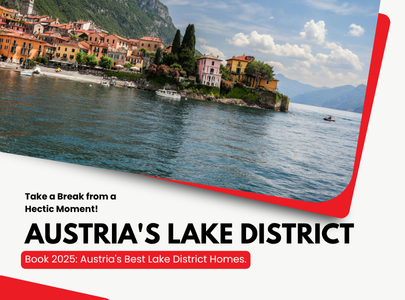Driving in Austria is undoubtedly an experience. It’s usually pleasant and relaxed, but if you don’t arrive with some prior knowledge, you might encounter unpleasant surprises. In Austria, people drive on the same side of the road, so there’s no problem renting a car and driving during your trip. It’s important to familiarize yourself with some of Austria’s driving laws and guidelines to ensure a safe and enjoyable trip.
We don’t want to bring you down, but bear in mind there’s a relatively high chance of getting a fine during your trip (sometimes for unclear reasons like parking in incorrect spots, which happens a lot to those unfamiliar with Vienna’s parking laws, for example). If you mentally prepare for this possibility, combined with good preparation for safe and proper driving, you’ll be set for a truly enjoyable trip across Austria.
Before we continue with information and recommendations regarding driving rules in Austria, you can get a glimpse into the typical rural roads of Austria in this video:
Main topics we’ll cover in this article (you can jump directly to the relevant section by clicking the table of contents):
- Driving Rules in Austria – Laws and Restrictions
- Highways and Toll Vignettes
- Recommendations and Car Rental Options – Up to 30% Less Than Most Companies
- Tips for Renting and Returning Your Car Without Worries or Unnecessary Payments
- How to Reduce Your Trip’s Car Expenses (Even If You’ve Already Rented)
Planning to rent a car for your trip?
Please note:
As a result of the slowdown during the COVID-19 period, most rental companies reduced their car fleets, leading to a shortage of rental cars – especially family cars. Of course, there has been an improvement in the last two years, but it’s still unclear when the situation will return to normal. Therefore, we recommend booking your rental car as early as possible! Especially if it’s a family car.
You can save time and compare prices among various rental companies in Vienna, Salzburg, Munich, Memmingen, etc., using the discounted search engine of the international company Discovercars, which offers discounts of up to 70% on car rentals, or the new Israeli search engine Paapam.
1. Driving Rules in Austria – Laws and Restrictions
Austrians are generally very friendly people (especially in rural areas), but they are very strict when it comes to laws and regulations. There are many cameras and enforcement on the roads, so it’s crucial not to disregard this if you plan to drive during your trip. Austrians are disciplined, courteous, and 99% non-aggressive drivers, making the driving experience in Austria truly wonderful and inspiring. Obey traffic signs, yield right of way, and maintain a safe distance, and you’re on the right track for easy, enjoyable, and safe driving during your trip to Austria.
Regarding driving speed, sometimes you won’t see signs explicitly stating the speed limit, but you’ll need to understand the maximum speed based on the environment. While there’s a margin of about 10% before getting a fine, it’s best not to risk it and simply maintain the required speed.
There are 3 main speed limits:
- In built-up areas (cities, towns, and villages) – 50 km/h; some villages have started limiting the speed to 30 km/h.
- On interurban roads – 100 km/h.
- On highways – 130 km/h.
When driving on rural roads, you might not notice that you’re entering a village, so it’s important to be alert. Sometimes you can use a navigation app if it alerts you in advance about the permitted speed in the area you’re driving. In any case, it’s important to look for signs on the side of the road, especially when driving on smaller roads between villages and towns. When you see a white sign with a village name, you’ll know you’re entering a 50 km/h zone, and sometimes even 30 km/h. In many cases, the speed limit is painted on the road, so you can’t miss it.
Other Important Rules While Driving in Austria
- Seat belts are mandatory while driving. The fine is €35.
- Children up to 14 years old whose height does not exceed 1.35 meters must use a special seat (booster or child car seat). Above 1.35 meters and up to 1.50 meters, it is still recommended to keep the child seat, but it’s not mandatory (a seat belt is sufficient).
- Drink driving is strictly enforced. The permitted blood alcohol level is 0.049. Above this level, there is a significant fine according to the alcohol level found, or even a complete revocation of the driving license within Austria.
- Using a phone while driving is completely forbidden.
- In case of poor visibility due to severe weather conditions or driving in complete darkness (most roads are dark at night), you must use your high beams. Many interurban roads and roads on the outskirts of villages are two-way roads without a physical separation, so it’s important to remember to dim your lights whenever another vehicle approaches to avoid dazzling the oncoming driver.
- You must present an international driving permit along with your national driving license.
Things You Must Have in the Car
There are several items that are legally required to be in your car when driving in Austria. The vast majority of rental companies provide this equipment, but it’s advisable to confirm this when collecting the keys.
- Warning triangle in accordance with regulation 27/EC.
- First aid kit.
- Reflective vest.
2. Toll Roads and Advance Payment
Every vehicle up to 3.5 tons (motorcycles, private cars) is required to pay a toll for driving on highways across the country. Proof of payment is called a Vignette, and it’s recommended to purchase it before you start driving on Austrian roads (if you rent a car from an Austrian company, they will provide the Vignette). Driving without a Vignette on toll roads will result in a heavy and unnecessary fine. When renting a car within Austria, you receive a Vignette as part of the package, but if you rent the car in a neighboring country (Germany, Slovakia, Slovenia, etc.), you must remember to purchase the sticker when entering Austria.
There are two ways to purchase the Vignette:
- Purchase a sticker at gas stations, ASFINAG stations, and kiosks.
- Pay online for a digital Vignette (not a sticker) – payment can be made directly through the website of the Austrian highway authority – https://shop.asfinag.at/. Please note: To pay for the toll online, you will need to know the license plate number of the car you will be driving, and also, the waiting time for the electronic Vignette when purchased independently is two weeks (due to purchase return laws in Austria. The purchase only becomes valid after two weeks without the possibility of cancellation).
The toll for 10 days is around €12, so there’s no reason to try and avoid paying.
Tip:
After you’ve purchased the Vignette, if you intend to use WAZE, you’ll need to add the “Vignette AT” option in the app. After selecting this option, your route will include toll roads.
If you wish to deepen your knowledge of driving in Austria, you can consult the detailed guide in English provided by the Austrian government. Additionally, it’s advisable to briefly review the traffic signs in Austria. Most main traffic signs will be familiar to you, but there might be some you don’t recognize from home. List of traffic signs in Austria.
3. Recommendations and Car Rental Options (Up to 30% Discount Opportunity)
If you’ve already read our article on recommended airports for landing before your trip to Austria, you’ve probably seen that there are quite a few options for getting to Austria. Some airports are within Austria, and some are in neighboring countries (Germany, Slovakia, or Slovenia). There are advantages and disadvantages to renting a car in Austria or outside of it, and it’s worth knowing this before making a decision.
Advantages of an Austrian Car Rental Company:
- Cars will meet the required standards in Austria.
- Highway tolls will be included in the price.
- Austrian license plate (sometimes saves questions if you are stopped for inspection).
- No additional payment for crossing between countries if you stay only within Austria (important to check with the rental company in any case).
Disadvantages of Renting in Austria:
- Car rental in Austria is considered more expensive than in its neighboring countries.
- Sometimes there are congestions at large airports, and you might need to wait to receive the car.
For example: For those landing in Vienna, renting a car from a Slovakian company might be up to 30% cheaper than renting from an Austrian company (we cooperate with the Slovakian companies BARKRO-Auto-Rental, and the prices are significantly cheaper than renting in Austria in general and in Vienna in particular).
You can read more about the benefits in the extended article.
Additionally, renting a car in Germany, if you land in Munich or Memmingen, can be cheaper than renting from Austrian companies in Austria.
4. Recommended Car Rental Companies for a Trip to Austria
- BARKRO Slovakian company – Bratislava Airport, Vienna Airport, and Vienna city center.
- AutoRental Slovakian company – Bratislava Airport, Vienna Airport.
- Zippy7 Autorent – Vienna city center.
- Avrix Slovakian company – Bratislava Airport, Vienna.
- Sixt (Austrian) company – Vienna Airport, Vienna city center, Salzburg, Munich, and Memmingen.
- Alamo German branch – Munich Airport.
- MunichCar24 – Munich city center.
5. Car Search Engines to Compare Prices from Various Rental Companies:
- Discovercars – A huge search engine in Hebrew with discounts of up to 70%.
- Paapam Paapam – This website offers an Israeli search engine for car rental deals for your trip.
- Rentalcars
Image Placeholder: A scenic road with a rainbow and mountains, with text overlay: “Search Car Rental from the Best Companies in Austria” and “Click to go to the search engine” with Rentalcars.com logo.
6. Planning to Rent a Car for Your Trip to Austria? Please Note:
If you are planning a family trip and need a large car, keep in mind that the supply of large vehicles is quite limited at most rental companies. Therefore, we recommend booking your rental car as early as possible! Especially if it’s a large family car. You can save time and compare prices among various rental companies in Vienna, Salzburg, Munich, Memmingen, etc., using the DiscoverCars search engine.
What’s Important to Remember Before Renting a Car in Austria?
- Look at the full package price – meaning the car itself along with all the extras from the previous section (including unlimited mileage, insurance, etc.).
- Pay attention to the service aspect – price is not the only parameter! If there’s a relatively negligible difference between offers – consider where you can get service that suits you better when needed.
- Don’t compromise on comprehensive car insurance with zero excess (at all) – it will save you grief if the car gets scratched during the trip. Zero excess insurance means that in case of damage to the car, you pay nothing and there’s no further hassle.
- Check how many kilometers are included in the offer. Some companies charge extra for driving beyond a specified mileage limit. Some companies offer unlimited mileage.
- Prepare an international driving permit before your trip – mandatory!
- Check if an additional driver is included in the payment (if needed).
- Child seats or boosters are sometimes provided for free by the rental company. It’s mandatory to mention this when contacting them.
- Some rental companies require a deposit, so you need a valid credit card that works abroad to pick up the keys.
- Check if GPS is included in the package; it definitely makes navigation easier. If not, you can look into a travel SIM card.
- Mentally prepare for the possibility of receiving a fine for speeding or anything else – in Austria, it happens to everyone (and quite often). Make sure to pay the fine on time to avoid unpleasant situations when you want to return to Austria (and you’ll probably want to return).
- Choose a comfortable and spacious car. Suitcases, bags, etc., must be taken into account when choosing the size of the car.
- When picking up the car, photograph it from all directions! This way you can prove pre-existing damages and avoid unpleasantness with the rental company.
- Are you returning the car to the same location where you picked it up? If not, be prepared for an additional charge.
- Return time – if you return the car outside the rental company’s operating hours (or on Sundays, for example), you will likely be charged an additional fee.
- It’s advisable to consider roadside assistance if traveling to places with difficult terrain.
- Read reviews from other people (via Google, etc.) to understand the company’s service quality in advance.
- Be prepared for a long wait at the airport to pick up the car. Sometimes there’s a lot of congestion, especially during summer.
What’s Important to Remember When Returning the Car at the End of the Trip?
- The car must be returned with a full tank of gas.
- You need to make sure the car isn’t dirty. Collecting trash and debris before returning the car is mandatory.
- Go over all the important points with a company representative when returning the car and ensure there will be no additional charges afterwards.
7. How to Reduce Car Costs Even If You’ve Already Booked (Free Service)?
A very nice Israeli service. This service is free!
Often, even after you’ve booked your trip car, prices can change a lot until your flight date. As part of the service, they will track prices for you, and if there’s a lower price for the same booking you made, they will help you rebook and reduce the rental cost. It’s simple and it works!
All you need to do is email them your car rental booking confirmation, and they will help you find a discounted deal and save money. Click here for more information on the car cost reduction service.



















